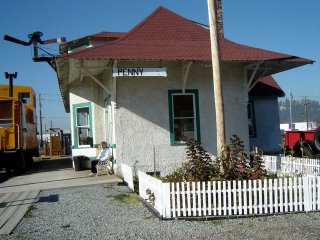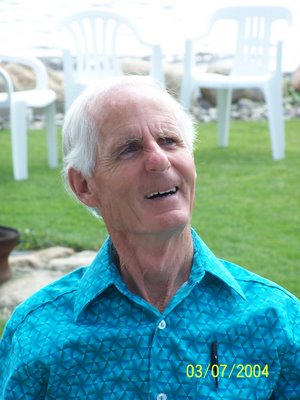This story written by my wife Fay, is a true account. It's a bit long for a blog, but it is worth the time to read it. First have your tissue box handy.
A TIME TO REMEMBER
November 11, 1943, Armistice Day, as it was called, took on a new meaning for me, a very personal one.
The service preceding the ceremonies at the cenotaph was always held in the largest church in town. As I sat on the hard, cold pew among the school children, I had mixed emotions. I felt proud and patriotic and yet sad and fearful.
Our class was part of the school choir, which was to sing the hymn, “Land of Hope and Glory.” We had practiced for a few weeks and I was quite sure of the words. If I did happen to forget some, there were others who would know them.
Yes, I was filled with Hope, hope that this war would soon end.
My father who was in the army had been away from home for over three years and only came for short visits, “leaves,” which seemed too far apart for me.
All seven uncles on my mother’s side of the family had joined either the army or the airforce. Now they were far across the ocean in some foreign county. Maybe they were fighting in a battle at this very moment.
Fear welled up from deep within me, and it just wouldn’t go away. I wondered would my dad be sent overseas and would the rest of my uncles come home again?
My thoughts were interrupted when it was announced that the choir would sing. This was followed by the poem, “In Flander’s Fields,” recited by a grade eight student. After a short message from the pastor of the church the rest of the ceremony took place outside at the town cenotaph, which was near the church. This was the part of the ceremony I liked best, when the men who had been in World War I, led the parade behind the pipe band. I suppose it was the music that caught my attention. Also I was impressed with the way these older men kept time to the beat of the drum. They proudly wore their medals on their chest as they took their place before the cenotaph. I was glad that I had something to display – a poppy, which I had bought with my own money. I had pinned it on my lapel.
The majority of people in the crowd who had gathered on the chilly November day were women and children. Most of the strong and healthy men were in one of the armed forces; but there were those who were needed at home, such as teachers, doctors, store keepers and farmers who tilled the land to produce food for the people.
Then the bugler took his place on the steps of the cenotaph and raised his instrument. Somber notes of the Last Post filled the air, making the gray sky seem even darker. This was followed with two minutes of silence. This was a time to remember the men who had left home and had died on a foreign battlefield.
As I bowed my head, I gathered my coat closer around me. The cold air reached not only my body but chilled me inside. I remembered the face of a young man whose smile was contagious and his dark sparkling eyes held a hint of mischief. I felt warm tears on my cold cheeks as my mind went back to that dreadful day in February, some nine months ago.
My Grandmother had come to stay with us for a while so that mother, who had been ill could take a needed rest.
It was late afternoon on that cold February day. My brothers were busy with chores; filling the wood box and making sure there was a good supply of coal. Meanwhile I was warming myself by the heater, a favorite spot of mine on a cold day. I knew by the aroma coming from the kitchen that Grandma was there and by the sound of scraping metal, that she was stirring one of her hearty soups as it simmered on the stove.
I heard the crunch of heavy footsteps on the snow covered porch – then a firm knock on the door. I left my place of comfort and opened the door. There stood our minister from the little Nazarene church, with a police officer beside him. Our minister asked if my grandmother, Mrs. Muirhead was in.
“Yes she is,” I replied.
As they stepped on the mat and closed the door behind them the cold air pushed back the warmth in the room. Instinctively I knew that this was not a social visit that our minister was making. I went to tell Grandma that she was wanted at the door. I shall never forget the look of confusion and fear in Grandma’s eyes as she looked at our minister and then at the police officer.
Our minister stepped forward and gently took grandma by the arm and led her to the sofa. The officer seated himself on a chair nearby and cleared his throat.
“Mrs. Muirhead, it is my duty to give you this message from the War Office.” He said as he unfolded a yellow paper and read aloud these words.
“I regret to inform you that on February 19, 1943 Flight Sargent, Donald Harvey Muirhead was killed while serving his King and Country. Details will follow. With kind regards. The Minister of War.”
Grandma sat in stunned silence for a minute or two as the words penetrated her mind. Her clear blue eyes filled with tears and her slender shoulders began to shake. Our kind minister put his arm around her as if she were his own mother.
Momentarily Grandma seemed paralyzed with shock and grief. Then she lifted her tear stained face, straightened her shoulders and said, “If one of my sons had to be taken I guess it is best that it was my youngest son, as he didn’t have a wife and children to leave behind.”
Before our minister left he read one of Grandma’s favorite portions of Scripture, Psalm 46 which begins: “God is our refuge and strength, a very present help in the time of trouble. Therefore will we not fear though the earth be removed and though the mountains be carried into the midst of the sea.” Then he prayed that God would comfort and give strength to her in this hour of trial.
Grandma seemed to have gained some of her composure and thanked our minister for his prayer. After the minister and officer left Grandma retreated to her bedroom for a while.
My brothers and I poured some soup into our bowls. Usually we had hearty appetites, but tonight we could only get a few spoonfuls down then pushed our bowls away. Later I made a cup of tea and carried it to Grandma, hoping that it would warm and comfort her.
That evening Grandma gathered her thoughts and courage. She put aside her own need for rest and explained to my brothers who had been outside when the news came that our uncle “Mickey”, as he was known to us, was killed in a plane crash and would not be coming home when the war was over.
It was hard for us to realize that this strong, handsome young uncle would not be coming to visit us any more. I remembered one of his favorite tricks when he came to visit us. He would reach out his hand and offer a stick of gum then quickly pull it back and say. “Guess in which hand the gum is.” We thought a lot of all our uncles but Uncle Mickey was special. Maybe it was because we knew him better than the others. Or was it that he made us the center of attention when he came?
Grandma and I shared a bedroom. That night after we had said our prayers and crawled under the covers, I lay still for some time, trying not to disturb Grandma. In the stillness of the night I heard Grandma’s muffled sobs as once again grief overtook her. I snuggled closer to her, hoping to help take away some of the loneliness, which she felt. This was the beginning of many nights when I would wake to hear my dear Grandma softly crying.
Although grandma was proud of her sons yet war was repulsive to her gentle spirit. Grandma was invited by the Prime Minister of Canada to attend a reception in Regina in her honor for being the mother who had the most sons (seven) from one family in Canada who were serving their country in the armed forces. She was reluctant to attend in case someone might think that she thought war was glorious.
It was her nightly prayer that God would keep her sons and that none of them would be personally responsible for taking another man’s life or that they would hold hatred in their heart.
It was somewhat of a comfort to Grandma when she later learned that my uncle had been killed while on a training mission and not in actual combat.
At the end of the war the rest of my uncles and my Dad returned home. Some of them had body wounds that eventually healed; but the wounds which did the most damage were the ones to their spirit. Not only did they suffer; but also some of their families suffered lasting effects from the long separation. War cost not only in military equipment but also in human relationships.
Grandma looked forward to the day as the scripture says, “And they shall beat their swords into plowshares, and their spears into pruning hooks; nation shall not lift up sword against nation neither shall they learn war anymore. Isaiah 2:4
This was written to let my grandchildren know how I experienced the affects of war and to help them appreciate a land of peace and the cost of freedom.
Fay Reimer
I think this a beautiful story. Fay has done an excellent job of putting it together. May the memory of war be just that - a memory.


